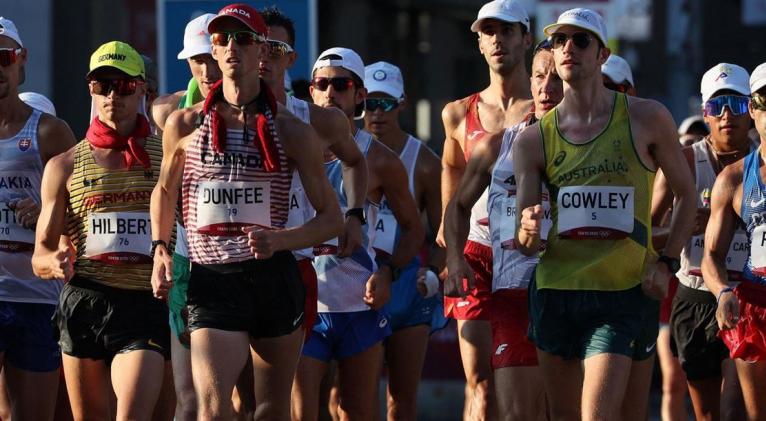Report: athletes and researchers warn of extreme heat risks at Paris Olympics
especiales

With the Paris Olympic Games just over a month away, athletes and climate scientists are warning of the dire consequences competitors could face as intense heat continues to impact and jeopardise sporting events around the world.
In a report released today, Rings of Fire: Heat Risks at the 2024 Paris Olympics, 20 world class athletes and several Olympians, including eight from the sport of athletics, joined climate scientists and leading heat physiologists from the University of Portsmouth to unpack the serious threat extreme heat poses for athletes.
The report discusses the deadly heatwave in France in 2003, which killed more than 14,000 people, and subsequent years of record-breaking temperatures, exceeding 42°C. It underscores the heightened risk of extreme heat during the Games in Paris where the average early August temperatures have risen by 3.1°C since 1924 when the French capital last hosted the Olympics. The French weather forecaster Meteo France has already predicted warmer than normal conditions for May to July across the country.
The report is a follow-up to the first, released in the lead-in to the Tokyo Olympic Games in 2021 which became known as the "hottest in history," with temperatures exceeding 34°C and humidity reaching nearly 70%, leading to severe health risks for competitors. In the Japanese capital, wheelchairs were deployed to carry athletes from sun-scorched areas, competitors fainted at finish lines and the fear of dying on court was even raised mid-match by the Tokyo Games’ number two seeded tennis player Daniel Medvedev.
The Paris Games have the potential to surpass that, researchers said, with climate change driven by the burning of fossil fuels contributing to record heat streaks in recent months. The year 2023 was the hottest on record according to the EU’s Copernicus Climate Change Service, and 2024 has continued the streak. April 2024 was warmer globally than any previous April in the record books, said experts at Copernicus.
World Athletics President Sebastian Coe and Jackson Tuwei, President of Athletics Kenya and World Athletics Vice President, voiced their concerns in the foreword messages they contributed to the report.
“For athletes, from smaller performance-impacting issues like sleep disruption and last minute changes to event timings, to exacerbated health impacts and heat related stress and injury, the consequences can be varied and wide-ranging,” Coe said.
“With global temperatures continuing to rise, climate change should increasingly be viewed as an existential threat to sport.”
Tuwei said: “The findings of this report are grave, but they are unsurprising to us as a country that this year has received such vivid reminders of the devastating impacts of climate change - most recently in the floods that claimed so many lives in April and May.
“Challenges are mounting for athletes regarding air pollution, food and water insecurity and lack of shade. And, as this report makes especially clear, the challenges of climate-change induced extreme heat for athletes are extensive and pose risks of devastating outcomes.”
The report also cites World Athletics’ proactive approach to the risks of increased heat, citing some of the work that the Health & Science team is carrying out, including its Beat the Heat guide for athletes and event organisers and their Race Emergency Courses for event medical directors. Also mentioned is the Champions for a Better World programme launched in 2022 to address athletes’ concerns about the impacts of climate change. Several athletes from the Champions group spoke in the report about their experiences and struggles to compete and train in increasingly hot and humid conditions, including Australian race walker Rhydian Cowley, who will be making his third consecutive Olympic appearance next month.
“We already know that extreme heat is a silent killer among the general population, and that even with prior preparation and intervention, it can still be risky for athletes to compete in,” Cowley said. “So absolutely I’m concerned that extreme heat in competition could threaten the lives of athletes.”
“These days, it feels like every major championship comes with an unprecedented heat wave,” US discus throw champion Sam Mattis, also a Tokyo Olympian, said.
“Being an athlete is about the art of pushing your limits just enough to get the most out of your body. When a variable like heat or wildfire smoke enters the equation, it throws off that balance and it can be hard to know where your limit is. We’ve already seen plenty of this in the last few years – from things as simple as athletes dropping out of a race, to more serious health issues like athletes passing out from heat stroke during competition - and it’s just going to continue to get worse in number and severity with rising temperatures.”
Swiss sprinter Ajla Del Ponte, Japanese race walker Yusuke Suzuki, Italian high jumper Elena Vallortigara and New Zealand pole vaulter Eliza McCartney described the impacts of suffering from heat stroke or heat exposure, impacts that in some cases lasted months, and two-time world javelin throw champion Kelsey-Lee Barber noted how quickly athletes have had to adapt to high heat conditions in both training and competition.
“I think it’s concerning how quickly this has become a reality, and while we have adapted to the likelihood of competing in extreme heat, the bigger picture of why we are experiencing it isn’t being addressed, it’s just been accepted and planned for,” said Barber. “I think there should be more awareness around the bigger picture when it comes to rising temperatures.”
The report, produced by the British Association for Sustainable Sport (BASIS) and FrontRunners, concludes by urging the sporting community to address these concerns and implement a series of athlete-inspired recommendations to ensure competitor safety and wellbeing. It highlights the urgent need to listen to athlete voices and place greater emphasis on protecting athletes and the fabric of sport as climate concerns intensify.














Add new comment